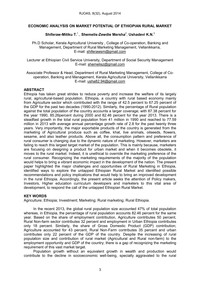ECONOMIC ANALYSIS ON MARKET POTENTIAL OF ETHIOPIAN RURAL MARKET
Покупка
Основная коллекция
Издательство:
Редакция журнала RJOAS
Автор:
Shiferaw-Mitiku Т.
Год издания: 2014
Кол-во страниц: 7
Дополнительно
Скопировать запись
Фрагмент текстового слоя документа размещен для индексирующих роботов
RJOAS, 8(32), August 2014
ECONOMIC ANALYSIS ON MARKET POTENTIAL OF ETHIOPIAN RURAL MARKET
Shiferaw-Mitiku T.¹., Shemelis-Zewdie Mersha², Ushadevi K.N.³
Ph.D Scholar, Kerala Agricultural University , College of Co-operation, Banking and Management, Department of Rural Marketing Management, Vellanikkarra,
E-mail: shiferawsm@gmail.com
Lecturer at Ethiopian Civil Service University, Department of Social Security Management E-mail: shemelisz@gmail.com
Associate Professor & Head, Department of Rural Marketing Management, College of Cooperation, Banking and Management, Kerala Agricultural University, Vellanikkarra E-mail: usha82.94@gmail.com
ABSTRACT
Ethiopia has taken great strides to reduce poverty and increase the welfare of its largely rural, agricultural-based population. Ethiopia, a country with rural based economy mainly from Agriculture sector which contributed with the range of 42.5 percent to 67.25 percent of the GDP for the past two decades (1990-2012). Similarly, the percentage of Rural population against the total population of the country accounts a larger coverage; with 87.38 percent for the year 1990, 85.26percent during 2000 and 82.46 percent for the year 2013. There is a steadfast growth in the total rural population from 41 million in 1990 and reached to 77.59 million in 2013 with average annual percentage growth rate of 2.8 for the past twenty three years. Very importantly, the major exportable products of the country is generated from the marketing of Agricultural produce such as coffee, khat, live animals, oilseeds, flowers, sesame, and also leather products. Above all, the consumption pattern and preference of rural consumer is changing due to the dynamic nature of marketing. However, marketers are failing to reach this largest target market of the population. This is mainly because, marketers are focusing on designing a product for urban market and when it becomes obsolete, it moves to the rural market. Indeed, it is unethical to override the marketing preference of the rural consumer. Recognizing the marketing requirements of the majority of the population would helps to bring a vibrant economic impact in the development of the nation. The present paper highlighted the major challenges and opportunities of Rural Marketing in Ethiopia, identified ways to explore the untapped Ethiopian Rural Market and identified possible recommendations and policy implications that would help to bring an improved development in the rural Ethiopia. Accordingly, the present article seeks the attention of Policy makers, Investors, Higher education curriculum developers and marketers to this vital area of development, to respond the call of the untapped Ethiopian Rural Market.
KEY WORDS
Agriculture; Ethiopia; Investment; Marketing; Rural marketing; Rural Ethiopia.
In the recent 2013, the global rural population size accounted 47% of total population whereas, in Ethiopia, the percentage of rural population accounts 82.46 percent for the same year. Based on the share of employment contribution, Agriculture contributes 50 percent, Rural Non-farm sector contributes 32 percent and employment in Urban Ethiopia contributes only 18 percent. Similarly, the share of Gross Domestic Product (GDP) contribution; Agriculture accounted for 43 percent, Rural Non-Farm contributes 35 percent and urban contributes only 22 percent of the GDP of the country. Despite the increasing of rural population size and contribution of rural market (Agricultural and Rural non-farm) to the employment opportunity and GDP of the country; there is a gap of recognizing the marketing requirement of this vast market target.
Population growth without an equivalent growth in wealth and production would contribute to the decline in socioeconomic well-being, specially aggravated to the rural
3


